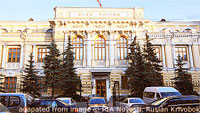Interfax: Lower key rate would not boost Russian economy – Central Bank

MOSCOW. May 16 (Interfax) – Lowering the key interest rate in current conditions would not result in growth for the real economy, Dmitry Tulin, first deputy governor of the Central Bank, said in the State Duma, during a discussion of the Central Bank’s annual report.
“We take into consideration the factor of the impact of monetary policy on the state of the real sector of the economy. If we had thought that our policy is too tight, and is killing the real sector and stifling any shoots of economic growth, then we’d probably have chosen a different trajectory for the key rate. We think that in today’s conditions, lowering the key rate would not result in growth for the real economy,” Tulin said.
Tulin said corporate profits grew 53% last year, although expectations were lower, however investment in the more successful sectors of the economy fell.
“This suggests that unfortunately, not everything is in order with the re-allocation of financial resources. The surplus liquidity that there is in the real sector and in the banking sector is not going towards the goals of increasing output and investment,” he said.
“Maintaining high real interest rates does not hurt the economy,” Tulin said.
“The main thing is not to rush into lowering the key rate. What else has there been to go by? By the fact it is very important to maintain stability. People are organized in such a way that they need stability, which is lacking. For reasons that can be discussed separately, we cannot right now ensure exchange-rate stability due to the structure of our economy, its excessive dependence on commodity exports. What we can do is to compensate to some extent, by keeping the interest rate environment stable. And here we were concerned that too abrupt a rate drop would then force us to backpedal and raise it. This would be bad for business and for the real sector of the economy, and for the prospects from emerging from stagnation. For us, rate stability is more important than rate fluctuations,” Tulin said.
He said that in recent months, the real interest rate had risen, “but there’s nothing out of the ordinary in that.” Maintaining a high level of real interest rates will not damage the real sector of the Russian economy he said.
Central Bank representatives enumerated the risks for inflation. The first risk is inflation expectations which may be the main contribution to inflation.
“Inflation cannot hold firm at 4% without a drop in inflation expectations. Success in achieving our inflation goal may turn out to be of a short-term nature or isolated without a drop in inflation expectations,” the head of the Department of Monetary policy of the Central Bank Igor Dmitriev said.
The second factor is uncertainty in relation to exchange rate dynamics.
“Inflation could easily jump up following unfavorable exchange rate dynamics, but then may be reluctant to go down,” Dmitriev said.
There are a number of other risks, including issues related to budgetary risks and also the high share of food products in the consumer basket.
Regarding growth factors in the Russian economy, Tulin said that, in the long term, rising exports just like higher consumer purchasing power cannot be a factor of sustained economic growth.
“The main factor leading to sustained growth may come from increasing investments. Unless there are any structural changes to our economy, our excessively loose monetary policy may lead to stagnation amid high inflation. If we conduct a tight policy and there aren’t important changes to the economy, there will still be stagnation, but amid low inflation. Our ability to influence real economic growth should not be overstated,” he said.
